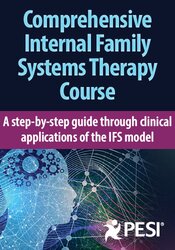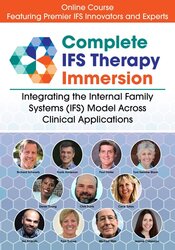Inside Out and Inside Out 2: Family-Friendly Film, or Psychotherapy for the Masses?

The sequel of a major emotion picture is set to be released on Friday, June 14. Just like before, thousands of families will be heading to the theater for what they think is an entertaining, family-friendly film.
...They're right. It is an entertaining, family-friendly film. But to the mental health world, it's a great example of one of the newest models of psychotherapy. Do you recognize it?
If you've been living under a rock (we won't judge you, it sounds divinely peaceful) and haven't caught the preview, take a moment to check it out. Just make sure to catch up with us below.
Just like Inside Out (2015), the sequel involves Internal Family Systems (IFS) and introduces "new" emotions like anxiety, envy, embarrassement, and boredom.
We chatted with Frank Anderson, M.D., psychotherapist and board chair of the IFS Center for Self Leadership, to get the low down on this revolutionary therapy.
I hope that these films help parents realize that parts are normal, and there is a way to work with them and acknowledge individual feelings without shaming someone.
We are also actively training new therapists and bringing IFS beyond the psychotherapy world as advocates of the need for emotional intelligence and understanding.
...They're right. It is an entertaining, family-friendly film. But to the mental health world, it's a great example of one of the newest models of psychotherapy. Do you recognize it?
If you've been living under a rock (we won't judge you, it sounds divinely peaceful) and haven't caught the preview, take a moment to check it out. Just make sure to catch up with us below.
Just like Inside Out (2015), the sequel involves Internal Family Systems (IFS) and introduces "new" emotions like anxiety, envy, embarrassement, and boredom.
We chatted with Frank Anderson, M.D., psychotherapist and board chair of the IFS Center for Self Leadership, to get the low down on this revolutionary therapy.
How was IFS developed?
Dick Schwartz developed IFS 30 years ago to help clients with eating disorders. Schwartz realized that clients were describing experiences with various parts, many extreme, within themselves. When these parts felt safe and had their concerns addressed, they were less disruptive. In developing IFS, he recognized that, as in systemic family theory, parts take on characteristic roles that help define the inner world of the client. Today, IFS has established a legacy of effectiveness in treating many mental health issues, and has been applied to a myriad of professional and lay public endeavors.What makes IFS unique compared to other treatment models?
Most modes of psychotherapy believe that if you have parts it's pathological. Not in IFS. In IFS the idea of multiplicity of the mind is normalized. Every part has a good intention, and every part has value. We strongly believe that all clients possess “Self Energy” and have the ability to heal themselves if they listen to their parts.The amount of practitioners being trained in IFS has grown significantly in the last few years. Why do you think that is?
I believe the meditation craze has help people realize that going inside and exploring the self is healing, and we do use meditation in IFS therapy. When people start going inside and listening to the different voices in their head, they start feeling better instantly. As more therapist begin using this treatment model, they are seeing its ability to permanently heal wounds and make a huge impact for their clients.What would you tell a therapist who is thinking about exploring IFS training?
IFS is a very powerful tool. Once you experience it and see it in action you will be hooked.What do you think of Pixar's film, Inside Out?
The IFS community is really excited about this film. When it comes to teaching our children about emotional intelligence we are failing. Most of what are children are experiencing in schools is cognitively based and behaviorally orientated. Bringing meditation into classrooms is a step in the right direction. However, we need to bring more emotional awareness to our children and destigmatize the idea of mental illness so we can promote maintaining mental health.I hope that these films help parents realize that parts are normal, and there is a way to work with them and acknowledge individual feelings without shaming someone.
What's next for the Center for Self Leadership?
The Center for Self Leadership is focused on bringing evidence-based validity to the IFS model. We are working to do research and prove the efficacy of this treatment model. Recently, the results of a randomized controlled study published in the Journal of Rheumatology showed that an IFS-based intervention had positive effects on patients with Rheumatoid Arthritis.We are also actively training new therapists and bringing IFS beyond the psychotherapy world as advocates of the need for emotional intelligence and understanding.
Online Course:
Comprehensive Internal Family Systems Therapy Course
Comprehensive Internal Family Systems Therapy Course

One of the most popular and effective treatment techniques used by mental health professionals today, thousands of clinicians already trust Internal Family Systems in their work to help clients struggling with anxiety, depression, trauma, addiction, and other mental health conditions.
Register today and discover how you can help change your clients’ lives with this evidence-based approach.This one-of-a-kind training is filled with broad applications that are within your scope of practice... so what are you waiting for? Uncover the critical things you should be doing right now to optimize your outcomes.
Register today and discover how you can help change your clients’ lives with this evidence-based approach.This one-of-a-kind training is filled with broad applications that are within your scope of practice... so what are you waiting for? Uncover the critical things you should be doing right now to optimize your outcomes.
Online Course:
Complete IFS Therapy Immersion Course
Complete IFS Therapy Immersion Course

Whether you’re brand new to Internal Family Systems (IFS) or have been practicing the model for years, register and discover how to refine and customize the model to fit your client’s unique needs and improve therapeutic outcomes for trauma, anxiety, shame, kids, couples, addictions, eating disorders, LGBTQIA+, racial trauma, and more.
Meet the Expert:
Frank Anderson, MD, completed his residency and was a clinical instructor in psychiatry at Harvard Medical School. He is both a psychiatrist and psychotherapist. He specializes in the treatment of trauma and dissociation and is passionate about teaching brain-based psychotherapy and integrating current neuroscience knowledge with the IFS model of therapy.
Dr. Anderson is a lead trainer at the IFS Institute with Richard Schwartz and maintains a long affiliation with, and trains for, Bessel van der Kolk’s Trauma Center. He serves as an advisor to the International Association of Trauma Professionals (IATP) and was the former chair and director of the Foundation for Self-Leadership.
Learn more about his educational products, including upcoming live seminars, by clicking here.
Dr. Anderson is a lead trainer at the IFS Institute with Richard Schwartz and maintains a long affiliation with, and trains for, Bessel van der Kolk’s Trauma Center. He serves as an advisor to the International Association of Trauma Professionals (IATP) and was the former chair and director of the Foundation for Self-Leadership.
Learn more about his educational products, including upcoming live seminars, by clicking here.



